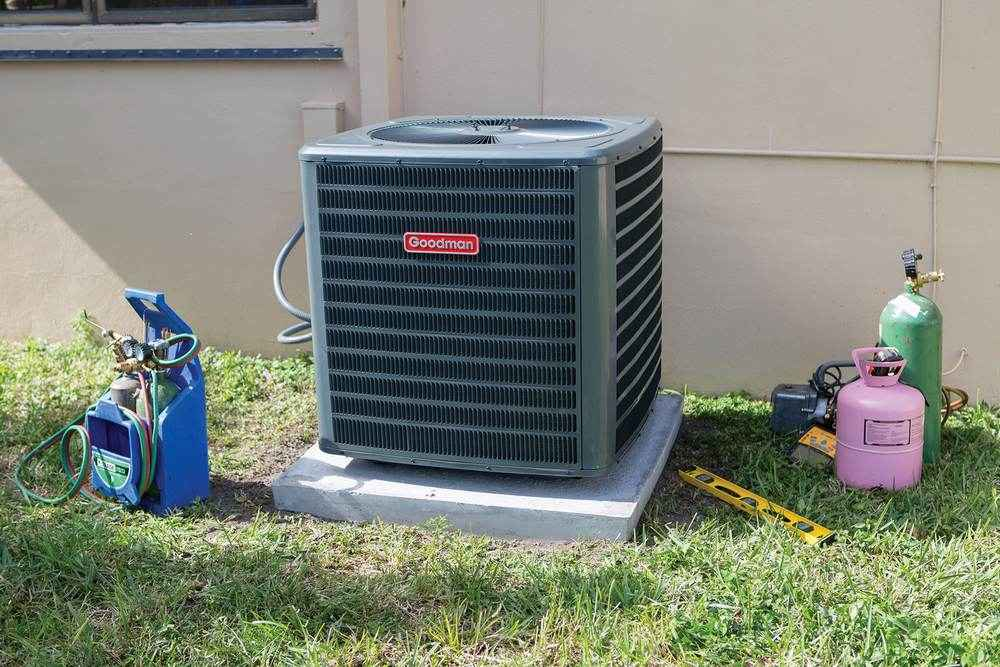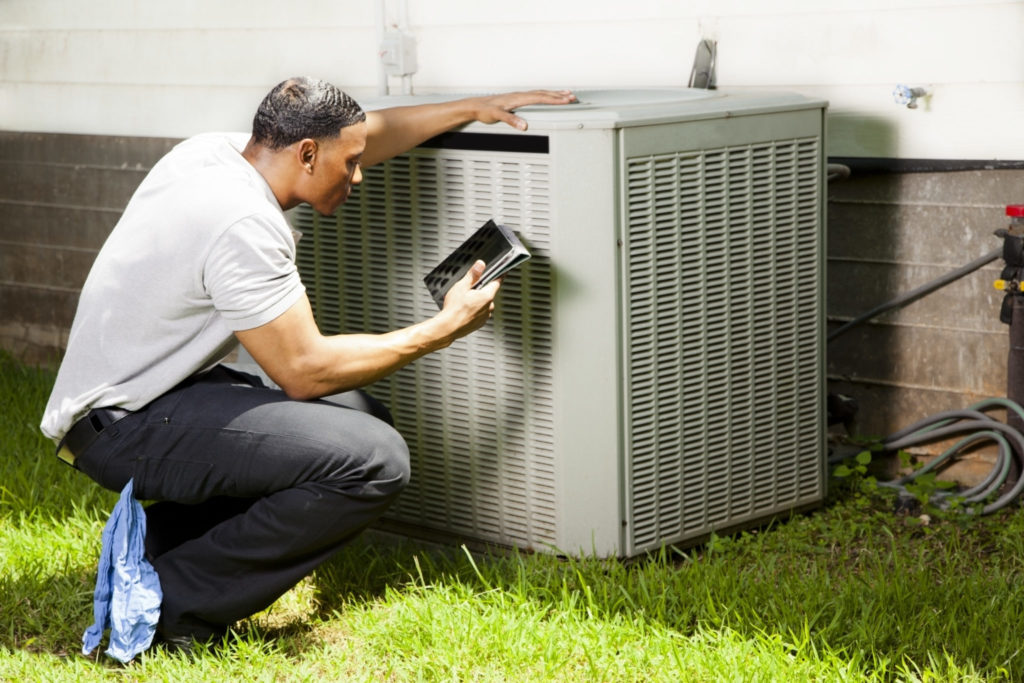
For Goodman air conditioner troubleshooting, follow these steps: check the power supply, clean the filters, ensure proper thermostat settings, and inspect for any blockages in the outdoor unit. Goodman air conditioners are known for their reliability and efficiency in cooling homes and offices.
However, like any other appliance, they may encounter issues and require troubleshooting. By following a few simple steps, you can address common problems and get your Goodman air conditioner up and running again. In this guide, we will explore the essential troubleshooting steps to help you identify and fix any issues with your Goodman air conditioner.
Whether it’s a power supply problem, dirty filters, incorrect thermostat settings, or outdoor unit blockages, we will outline the necessary actions to rectify the situation and ensure your air conditioner functions optimally. So, let’s dive in and troubleshoot your Goodman air conditioner efficiently.

Credit: m.youtube.com
Common Issues
Is your Goodman air conditioner not functioning as efficiently as it used to? Don’t worry, we’ve got you covered. In this section, we will explore some common issues that you may encounter with your Goodman air conditioner. By identifying these problems and understanding how to troubleshoot them, you can potentially save time and money on unnecessary repair calls. Let’s dive right in!
Unit Not Cooling
If you’ve noticed that your Goodman air conditioner is no longer providing the cooling relief it once did, there could be a few possible reasons behind this issue. Before calling in a professional, here’s what you can check:
- Check the thermostat settings: Ensure that the thermostat is set to the desired cooling temperature. If it’s set too high or too low, it can affect the cooling performance of your unit.
- Inspect the air filter: A clogged or dirty air filter can restrict airflow and hinder the cooling process. Check the filter and replace it if necessary, ensuring proper airflow.
- Examine the condenser unit: The outdoor condenser unit plays a vital role in cooling your home. Make sure there is no debris or vegetation obstructing the unit. Clean any accumulated dirt or leaves that may be hindering its performance.
- Verify the refrigerant level: Insufficient refrigerant can impair the cooling capacity of your air conditioner. If you suspect a refrigerant leak, it’s best to contact a professional technician to diagnose and resolve the issue.
By addressing these potential issues, you may be able to restore your Goodman air conditioner’s cooling capabilities without costly repairs.
Airflow Problems
Inadequate airflow can significantly impact the performance of your Goodman air conditioner. If you notice weak airflow or hot spots in your home, consider the following troubleshooting steps:
- Check the vents and registers: Ensure that all vents and registers are open and unobstructed. Furniture, rugs, or curtains placed in front of vents can restrict the airflow.
- Inspect the air ducts: Leaky or poorly insulated air ducts can lead to reduced airflow. Examine the ductwork for any visible damage or leaks. It’s advisable to hire a professional to handle duct repairs or insulation.
- Clean the evaporator coils: Over time, dust and debris can accumulate on the evaporator coils, impeding airflow. Regularly cleaning the coils can help maintain optimal performance.
- Check the blower motor: A malfunctioning blower motor can affect airflow. Ensure the motor is running smoothly and consider lubricating it if necessary. If the motor is faulty, it may need professional attention.
By addressing these airflow problems, you can ensure that your Goodman air conditioner is delivering cool air effectively throughout your home.
Strange Noises
If your Goodman air conditioner is making unusual noises, it’s essential to identify the source of the sound to prevent potential damage. Here are some common noises and their possible causes:
| Noise | Cause |
|---|---|
| Rattling or clanking | Loose or damaged components, such as screws, fan blades, or motor mounts. Check and tighten any loose parts or seek professional assistance to resolve the issue. |
| Squealing or screeching | Worn-out or slipping belts. Inspect the belts for any signs of damage or wear and replace them if necessary to prevent further issues. |
| Buzzing or humming | Electrical issues or loose connections. Ensure all electrical connections are securely fastened and seek professional help if you suspect wiring problems. |
| Hissing or gurgling | Refrigerant leaks or low refrigerant levels. Contact a professional to locate and fix the leak, as well as recharge the refrigerant if needed. |
Addressing these strange noises promptly can help prevent further damage to your Goodman air conditioner and ensure a more peaceful and efficient cooling experience.
Troubleshooting Steps
Troubleshooting your Goodman air conditioner can help you identify and resolve common issues without the need for professional assistance. By following these troubleshooting steps, you can potentially save time, money, and the discomfort associated with a malfunctioning unit. Let’s dive into the details:
Check Thermostat Settings
One of the first steps in troubleshooting your Goodman air conditioner is to check the thermostat settings. Ensure that the thermostat is set to the desired temperature and that it is in the cooling mode. Sometimes, simple human error can result in an air conditioner not functioning properly, so double-checking the settings can often resolve the issue.
Inspect Air Filters
Air filters play a crucial role in maintaining the efficiency of your Goodman air conditioner. Clogged or dirty filters can restrict airflow and hinder the unit’s cooling performance. Therefore, inspect the air filters regularly and clean or replace them as needed. By keeping the filters clean, you can extend the lifespan of your air conditioner and improve its overall performance.
Clean Condenser Coils
Condenser coils are an essential component of an air conditioner, responsible for transferring heat from inside your home to the outside environment. Over time, these coils can accumulate dirt, debris, and dust, reducing their effectiveness. Regularly cleaning the condenser coils can enhance your air conditioner’s efficiency and cooling capacity, ensuring optimal performance.
Check For Refrigerant Leaks
Refrigerant leaks can lead to inadequate cooling or complete failure of your Goodman air conditioner. If you suspect a refrigerant leak, it’s essential to address it promptly. Check for any signs of oil stains, ice buildup, or hissing sounds near the refrigerant lines. If you notice any of these warning signs, consult a professional technician to identify and repair the leak.
Inspect Electrical Connections
Proper electrical connections are crucial for the efficient functioning of your Goodman air conditioner. Loose or faulty connections can lead to system failure or even pose a safety hazard. Regularly inspect the electrical connections, ensuring they are secure and free of any corrosion or damage. If you notice any issues, contact a licensed HVAC technician to address the problem.
By following these troubleshooting steps, you can confidently address common issues that may arise with your Goodman air conditioner. Remember, if you encounter more complex problems or are unsure about performing any troubleshooting steps, it’s always best to seek professional help from an experienced HVAC technician.
When To Call A Professional
While some air conditioner issues can be resolved with basic troubleshooting, there are situations where it is best to seek the expertise of a professional. Attempting to fix certain problems on your own can lead to further damage or even pose a safety hazard. In this article, we will discuss three specific situations where it is recommended to call in a professional for Goodman air conditioner troubleshooting.
Electrical Issues
When it comes to electrical issues with your Goodman air conditioner, it is crucial to leave the troubleshooting to a professional. Dealing with electricity can be risky and requires specialized knowledge. A licensed technician will have the necessary skills to diagnose and resolve any electrical problems your unit may be experiencing.
Common electrical issues with air conditioners include:
- Frequent tripping of circuit breakers
- Blown fuses
- Malfunctioning thermostat
If you notice any of these issues, it is best to call a professional right away. They will have the tools and expertise to identify the root cause of the problem and safely resolve it.
Refrigerant Leaks
Refrigerant leaks can greatly affect the performance of your Goodman air conditioner. DIY attempts to fix refrigerant leaks are not recommended as they involve handling potentially harmful chemicals. Additionally, refrigerant leaks are indicative of a larger problem within the system that requires professional attention.
Symptoms of a refrigerant leak include:
- Insufficient cooling
- Inconsistent temperature
- Icing on refrigerant lines
If you suspect a refrigerant leak, it is important to contact a professional HVAC technician who can accurately diagnose the issue, repair the leak, and recharge the refrigerant to restore your air conditioner’s performance.
Major Malfunctions
In some cases, your Goodman air conditioner may experience major malfunctions that require the expertise of a professional to fix. These malfunctions can be caused by various factors, such as faulty components, motor issues, or system failure.
Signs of major malfunctions may include:
- No power or inability to turn on
- Loud or unusual noises
- Burning smell
- Water leakage
If you encounter any of these problems, it is essential to reach out to a qualified technician who can identify the underlying cause and provide appropriate repairs or replacements.
Remember, attempting to troubleshoot these complex problems without proper knowledge can lead to more extensive damage and higher repair costs. By contacting a professional for Goodman air conditioner troubleshooting, you can ensure a safe, efficient, and long-lasting solution to your cooling needs.

Credit: dependablehvacatlanta.com

Credit: www.hvac.com
Frequently Asked Questions For Goodman Air Conditioner Troubleshooting
How Do I Troubleshoot A Noisy Goodman Air Conditioner?
To troubleshoot a noisy Goodman air conditioner, start by checking if the unit is properly leveled and mounted. Inspect the fan and make sure it’s clean and free from any obstructions. Additionally, check if the motor or motor mount is loose or worn out.
If the issue persists, it’s best to contact a professional technician for further assistance.
Why Is My Goodman Air Conditioner Not Cooling Properly?
If your Goodman air conditioner is not cooling properly, check if the air filter is dirty or clogged. Replace or clean the filter if necessary. Ensure that all vents are open and not blocked. Additionally, check if the thermostat settings are correct and if the outdoor unit is clear of debris.
If the problem persists, it’s recommended to contact a professional technician.
What Should I Do If My Goodman Air Conditioner Is Not Turning On?
If your Goodman air conditioner is not turning on, start by checking if the thermostat is set to the desired temperature and the unit is receiving power. Ensure that the circuit breaker for the air conditioner is not tripped. If everything appears to be in order, it’s advisable to contact a professional technician for further diagnosis and repair.
How Often Should I Clean The Outdoor Condenser Of My Goodman Air Conditioner?
For optimal performance, it’s recommended to clean the outdoor condenser of your Goodman air conditioner at least once a year. However, if you live in a dusty or heavily polluted area, it may be necessary to clean it more frequently.
Regular cleaning helps prevent clogs and ensures efficient airflow, prolonging the lifespan of your unit.
Conclusion
To conclude, troubleshooting your Goodman air conditioner can be a simple and cost-effective way to fix common issues. By following the steps outlined in this blog post, you can identify and resolve problems such as inadequate cooling, unusual noises, or airflow issues.
Regular maintenance and proper care can prolong the lifespan of your unit and ensure its optimal performance. So, don’t hesitate to take action and keep your Goodman air conditioner running smoothly throughout the year.






